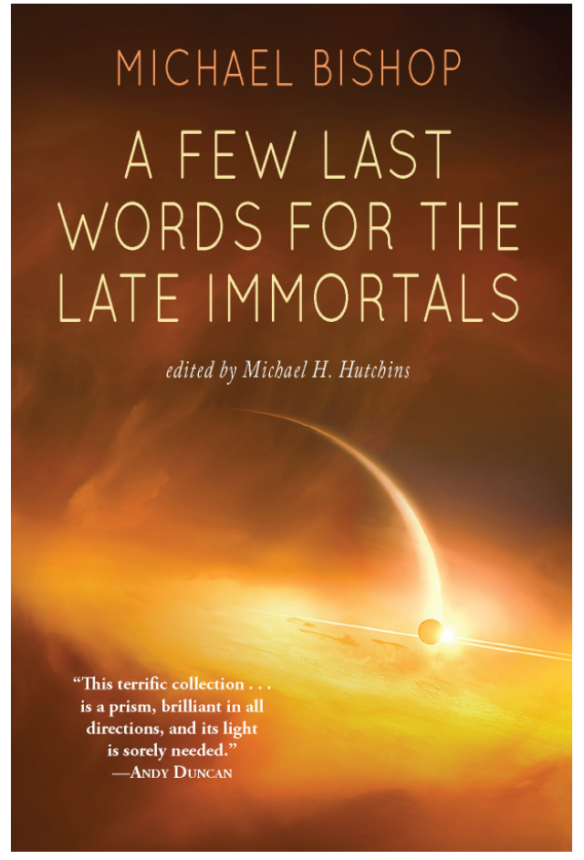By Mark L. Blackman: On the evening of Thursday, September 9, 2021, the New York Review of Science Fiction Readings Series opened its 29th season with a reading from Nebula Award-winning author Michael Bishop. The event was simulcast on YouTube and Facebook.
(Yes, the readings are usually on Tuesdays, but Tuesday was Rosh HaShanah, and the reader was, after all, a Bishop. Appropriately, his text was a religious-themed story.)
Michael Bishop is the author of some 35 books, including collections, collaborations and anthologies that he has edited, among them No Enemy But Time, Unicorn Mountain, Brittle Innings, A Funeral for the Eyes of Fire (and its revision Eyes of Fire), and Transfigurations (an expansion of “Death and Designation Among the Asadi”), and short stories including “The Quickening” (which earned him his first Nebula Award), “The White Otters of Childhood,” “Dogs’ Lives,” “The Samurai and the Willows,” and “Life Regarded as a Jigsaw Puzzle of Highly Lustrous Cats.”

The evening began with Series Executive Curator Jim Freund, host of WBAI-FM’s The Hour of the Wolf, introducing and interviewing Bishop. The cover of Bishop’s current book, A Few Last Words for the Late Immortals, a collection of short pieces, including poetry, depicts a baseball player, led Freund to ask why is baseball (still officially our National Pastime) such a great venue for sf and fantasy? Bishop suggested several reasons. The stadiums have an enchanted, even a haunted quality; because the games have no time limit and so can go on for days, “even years”; and because it spotlights individuals as well as the teams that they are operating as part of.
Bishop read not from the title story, but the last story in the book, a 3,000-word science fantasy, “Yahweh’s Hour.” He indicated scenes set in Roman type (set in the main character’s present) and italics (scenes involving the audience and the Creator, who is not necessarily divine). Set in a we-hope-not future of the Patchwork States of America, a literal theocracy under Overman Dad (who is not above operating spas and casinos), the titular TVshow has 100% viewership. In the audience, Mercer, granted an amnesty by Dad for murdering a teenaged transsexual, is unimpressed, until he experiences a vision or miracle.
The story was originally published as “God’s Hour” in the June 1987 issue of Omni, and did not include Mercer or Overman Dad as characters. He began revising the story after the November 2020 Election and finished after the January 6th insurrection. This led organically to a side chat about politics. Georgia, where Bishop lives, is a red state becoming a blue state. Trump was “a wretched President,” “a parody of himself,” a man with no political philosophy except Trumpism; the “election-rigging” was that “people voted.” Bishop, who has medical issues, called politicization of getting shots “absurd.”
Freund asked about Mercer’s name. Bishop noted that there is a Mercer University in Macon, Georgia not far from him and the name evokes mercy. Freund wondered if it alluded to Mercer, a Sisyphus figure, and his religion Mercerism in Do Androids Dream of Electric Sheep? Bishop, the author of Philip K. Dick is Dead, Alas, was surprised and confessed that he had forgotten that there was a character Mercer in the book.
Freund relayed audience questions. Did he attend a lot of author readings and does he miss them? Well, he didn’t go to conventions monthly like some of his author friends, and especially now due to his health, but yes, he misses contact with an audience. Some authors had said that the pandemic had given them time to work, but that was not so for Bishop. After he related that many of his stories are about characters in conflict with themselves, but that he personally avoids conflict. Does he work out conflicts in his stories? Yes, and he cited Unicorn Mountain.
He was asked about his experiences of revising his work. Sometimes he was surprised that a story did not “work out well,” and his reason for revising is that he wants a piece “to be the best version of itself.” Also, medical issues have slowed down his production of new material, but he is able to revise, creating something akin to new.
He was “happy at the time” about “The Quickening” (well, it won the Nebula, Freund interjected), and surprised by No Enemy But Time’s win in view of what it was up against. It is being revised next year for a 40th anniversary edition, with some things “knocked out to improve it” (he thanked Gregory Feeley for advice).
He was asked what work of his had needed the most revision. Unicorn Mountain; he cut 20,000 words and added material. He also revised several stories for A Few Last Words for the Late Immortals, as well as poetry. “The Scaffold,” he reported, a new poem, was a response to Dylan Thomas’s “A Refusal to Mourn the Death, By Fire, of a Child in London,” which led to a digression about Thomas’s recording of Under Milk Wood by Caedmon Records in a studio later used by WBAI. Freund noted that none of Bishop’s books are in audiobook form, and that he might help arrange something.
There being time for it, Bishop ended with an sf poem that had been sold to Analog and reprinted in a Best of anthology, “Secrets of the Alien Reliquary.” An Earth military expedition explores an alien bawdy house displaying Earth “deviance” and just plain oddities (Ed Asner ??).
Freund concluded the evening with a request for donations (software and production do cost), thanking Barbara Krasnoff, who did the engineering, and announcing upcoming readers (back on Tuesdays):
- October 5: Jason Erik Lundberg
- November 2: Nicole Glover (event guest-curated by Amy Goldschlager)
Discover more from File 770
Subscribe to get the latest posts to your email.

Thanks for the report! I always learn something from someone else’s responses to art and performance.